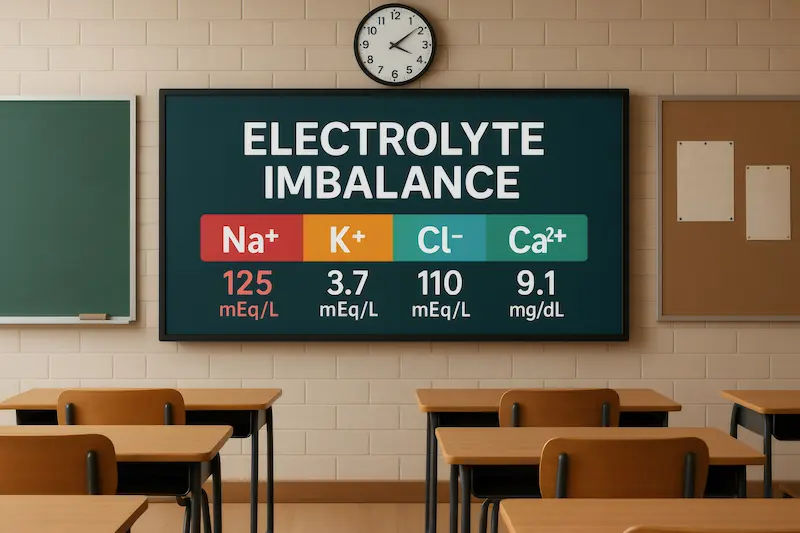Understanding Electrolyte Imbalance and Treatment
Know about electrolyte imbalance , what are electrolytes, symptoms, diagnosis, treatment and management of imbalance in electrolytes and more.

Written by Dr. Rohinipriyanka Pondugula
Reviewed by Dr. Md Yusuf Shareef MBBS
Last updated on 13th Jan, 2026

Electrolytes are essential minerals in your body that carry an electric charge and play a crucial role in various bodily functions. They help regulate nerve and muscle function, maintain hydration, balance blood pH, and support other vital processes. However, when their levels become too high or too low, it can lead to an electrolyte imbalance, which can cause serious health issues if left untreated.
In this article, we’ll explore what electrolyte imbalance is, its symptoms, causes, and how you can manage or treat it effectively.
What Are Electrolytes?
Electrolytes are minerals found in your blood, urine, and body fluids. The most important ones include:
Sodium – Helps control fluid balance and nerve/muscle function.
Potassium – Supports heart function and muscle contractions.
Calcium – Essential for bone health, muscle movement, and nerve signalling.
Magnesium – Aids in muscle and nerve function, as well as energy production.
Chloride – Helps maintain fluid balance and digestion.
Phosphate – Works with calcium to strengthen bones and teeth.
Consult a General Physician for Personalised Advice
Your body carefully regulates electrolyte levels, but certain conditions can disrupt this balance.
Symptoms of Electrolyte Imbalance
An electrolyte imbalance can cause a range of symptoms, depending on which mineral is affected. Common signs include:
Muscle cramps or weakness
Irregular heartbeat (palpitations)
Fatigue or lethargy
Nausea or vomiting
Confusion or difficulty concentrating
Headaches
Tingling or numbness
Excessive thirst or dry mouth
Seizures (in severe cases)
If you experience any of these symptoms persistently, it’s important to consult a doctor.
Common Causes of Electrolyte Imbalance
Several factors can lead to an electrolyte imbalance, including:
1. Dehydration
Not drinking enough water or losing too much fluid (due to sweating, diarrhoea, or vomiting) can disrupt electrolyte levels.
2. Kidney Disease
The kidneys help regulate electrolytes, so kidney dysfunction can lead to imbalances.
3. Medications
Certain drugs (like diuretics, laxatives, or blood pressure medications) can affect electrolyte levels.
4. Poor Diet
A diet lacking in essential minerals (e.g., low potassium or magnesium) can contribute to imbalances.
5. Chronic Illnesses
Conditions like diabetes, heart disease, or hormonal disorders (e.g., adrenal insufficiency) can disrupt electrolyte balance.
6. Excessive Exercise
Intense workouts without proper hydration can lead to loss of electrolytes through sweat.
How to Diagnose Electrolyte Imbalance
If your doctor suspects an electrolyte imbalance, they may recommend:
Blood tests – To measure levels of sodium, potassium, calcium, etc.
Urine tests – To check for excessive mineral loss.
ECG (Electrocardiogram) – If heart-related symptoms are present.
Get Your Health Assessed
Treatment and Management
The treatment depends on the type and severity of the imbalance. Common approaches include:
1. Rehydration
Drinking oral rehydration solutions (ORS) or electrolyte-rich beverages.
In severe cases, IV fluids may be needed.
2. Dietary Adjustments
Increase potassium (bananas, spinach, sweet potatoes).
Boost sodium (moderate salt intake, but avoid excess).
Get enough calcium (dairy, leafy greens, fortified foods).
Include magnesium-rich foods (nuts, seeds, whole grains).
3. Medication Adjustments
If medications are causing the imbalance, your doctor may adjust the dosage or switch prescriptions.
4. Treating Underlying Conditions
Managing diseases like diabetes or kidney disorders can help restore balance.
Prevention Tips
To maintain healthy electrolyte levels:
Stay hydrated – Drink enough water, especially during exercise or illness.
Eat a balanced diet – Include fruits, vegetables, nuts, and dairy.
Monitor medications – Discuss side effects with your doctor.
Avoid excessive alcohol or caffeine – They can contribute to dehydration.
Listen to your body – If you feel unusually tired or weak, seek medical advice.
When to See a Doctor?
Seek immediate medical attention if you experience:
Severe muscle weakness or spasms.
Irregular heartbeat.
Confusion or seizures.
Persistent vomiting or diarrhoea.
Final Thoughts
Electrolyte imbalances can affect anyone but are often manageable with proper hydration, diet, and medical care. By recognising the symptoms early and taking preventive steps, you can maintain a healthy balance and avoid complications.
Consult a General Physician for Personalised Advice
Consult a General Physician for Personalised Advice

Dr. Rajib Ghose
General Physician/ Internal Medicine Specialist
25 Years • MBBS
East Midnapore
VIVEKANANDA SEBA SADAN, East Midnapore

Dr. Aakash Garg
Gastroenterology/gi Medicine Specialist
12 Years • MBBS, DNB (Medicine), DrNB (Gastroentrology).
Bilaspur
Apollo Hospitals Seepat Road, Bilaspur
(150+ Patients)

Dr. Abhishek Gowda
General Physician/ Internal Medicine Specialist
3 Years • MBBS MD General Medicine
Bengaluru
PRESTIGE SHANTHINIKETAN - SOCIETY CLINIC, Bengaluru

Dr. Moumita Roy
General Physician/ Internal Medicine Specialist
8 Years • MBBS , MD (Anesthesiology)
Kolkata
VDC Clinic, Kolkata

Dr. Arif Ahmed
General Physician/ Internal Medicine Specialist
9 Years • MBBS, MD (Genl. Med.)
Kolkata
MCR SUPER SPECIALITY POLY CLINIC & PATHOLOGY, Kolkata


